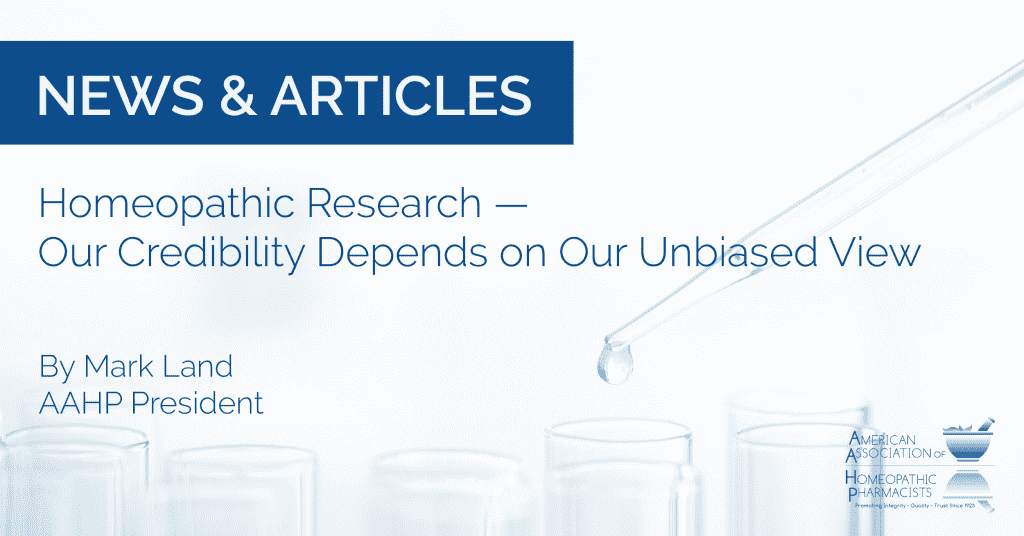Homeopathic Research — Our Credibility Depends on Our Unbiased View

By Mark Land, AAHP President
Dissemination of research information deserves careful consideration to avoid bias. Research information — basic or applied — risks misinterpretation if it is incomplete or misleadingly presented. The Food Drug and Cosmetic Act protects against these risks as it relates to clinical research information related to drugs1. Formatting, abstracting, and summarizing research information could create false impressions if it does not contain full and complete listings of all relevant research on the topic, including failed examinations.
Today we have access to many databases and search engines, allowing one to investigate a complete listing of research information. Often access is only limited by one’s imagination when developing the search strategy or occasionally subscription services. Google, Clinical trials.gov, PubMed, University libraries and others are great options when developing a bibliography.
Much has been said about research databases in homeopathy. The National Center for Homeopathy,2 the American Institute of Homeopathy,3 the Homeopathic Research Institute4 and others have full listings of research articles on both basic and applied research in homeopathy. Some of these sites curate research into categories. Other sites allow the user to define the search strategy. I much prefer the approach of user-defined search strategy.
When disseminating research information to health care professionals that are non-homeopaths, it is important that a full bibliography accompanies the research article of interest. If subscription barriers to important articles within the bibliography exist, that must be addressed as part of the plan to communicate medical information.
One should use sound judgment when evaluating research information. Basis of evaluation includes study design, number of participants, controls, and statistical methods. Volumes are written on this subject but I will give one example to illustrate the point. Recently I read a research summary titled, “Homeopathy Is an Antibiotic.” The conclusion that homeopathy is an antibiotic was surmised from an uncontrolled study involving a few patients suffering from sinusitis successfully treated homeopathically.
While we are all hopeful about the public health benefit of homeopathy, jumping to dissociated conclusions from limited research is not helpful. In fact, it is harmful to our reputation and exactly what we accuse of the skeptics. Trusting our colleagues to make well-reasoned decisions based on complete research information presented in an unbiased manner is my recommendation.
- United States Food and Drug Administration 21 CFR 99 Dissemination of Information on Unapproved/New Uses for marketed Products https://www.accessdata.fda.gov/scripts/cdrh/cfdocs/cfcfr/CFRSearch.cfm?CFRPart=99&showFR=1
- The National Center for Homeopathy https://www.homeopathycenter.org/
- The American Institute of Homeopathy https://www.homeopathyusa.org/
- The Homeopathic Research Institute https://www.hri-research.org/
